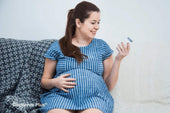What to Know About Vitamin D and Pregnancy for a Healthy Baby

You might not think much about it, but vitamin D and pregnancy go hand in hand. This simple vitamin plays such an important role for both mom and baby that skipping it can lead to all sorts of issues. For the baby, vitamin D helps with building strong bones, a healthy heart, and a strong nervous system. For you, it helps keep your immune system working well and reduces complications like gestational diabetes or preeclampsia [1]. Pretty amazing, right?
If you're pregnant or trying to get pregnant, you should know why this nutrient is such a big deal. It’s not just about sunlight or milk; it’s about doing everything you can to support your body during one of the most amazing journeys you'll ever take.
Why Is Vitamin D a Must During Pregnancy?
So, let’s dive into the "why." Why is vitamin D during pregnancy such a big deal? For starters, this vitamin helps your body absorb calcium and phosphorus, which are super important for building your baby’s bones and teeth. Without enough vitamin D, your baby’s development could take a hit. And it’s not just bones—it also helps with the nervous system, kidneys, and even the heart.
For you, it’s equally important. Low levels of vitamin D in pregnancy can increase your risk of preeclampsia, which is a pretty serious condition that can raise your blood pressure to dangerous levels. Plus, it’s linked to preterm labor and low birth weight. Nobody wants that.
Let’s not forget your immune system, either. Pregnancy naturally lowers your immunity, but vitamin D can help keep it strong, which means fewer infections and complications for you [2].
Can I Take Vitamin D While Pregnant?
Short answer: Yes! So many people wonder, can I take vitamin D while pregnant? Absolutely, and honestly, you probably should. Most of us don’t get enough vitamin D from food or sunlight alone, and healthy pregnancy increases your needs. Your body is working overtime to grow another human, so you’ve got to give it the tools it needs.
Doctors recommend at least 10 micrograms (400 IU) of vitamin D per day for pregnant women, but if you’re deficient, you might need more. That’s something you’d discuss with your doctor. The bottom line is, taking vitamin D while pregnant helps you avoid complications and gives your baby a solid start [3].
Can You Take Vitamin D While Pregnant?
Another common question is, can you take vitamin D while pregnant? Not only can you, but you should. Vitamin D3, the best form for your body to absorb, is often found in prenatal supplements. Known as D3 supplement pregnancy, this form of vitamin D helps your body absorb calcium better than any other.
Here’s the thing—your baby relies on you for everything, including vitamin D. If you’re not getting enough, neither is your baby. And that’s not good. Supplementing with vitamin D3 ensures your body has what it needs to support both of you. It’s safe, it’s effective, and it’s recommended by healthcare providers everywhere [4].
Why Does Vitamin D Matter for Fertility?
Okay, so we’ve talked about pregnancy, but did you know vitamin D for pregnancy starts being important even before you conceive? Yep, it’s true. Vitamin D helps regulate hormones, which is a huge deal when you’re trying to get pregnant.
For women, it supports regular ovulation and improves egg quality. For men, it boosts sperm health and motility. Together, that’s a recipe for better chances of conception. Some research even suggests that vitamin D can improve the uterine lining, making it easier for a fertilized egg to implant.
If you and your partner are trying to conceive, it’s worth looking into vitamin D levels for both of you. It could make a real difference [5].
What Happens If You’re Deficient in Vitamin D During Pregnancy?
Unfortunately, vitamin D deficiency isn’t uncommon. In fact, it’s pretty widespread. If your levels of vitamin D pregnancy are low, you’re more likely to experience complications like preeclampsia, gestational diabetes, or even preterm labor.
For your baby, the risks are just as concerning. Low levels of vitamin D in pregnancy can lead to poor bone development, which could cause issues like rickets. It can also impact the baby’s immune system, making them more vulnerable to infections after birth.
Deficiency can happen for all sorts of reasons. Maybe you’re not getting enough sunlight, or your diet is lacking. Whatever the case, it’s worth addressing. A simple blood test can tell you if your levels are where they need to be, and if they’re not, your doctor can recommend the right supplementation [6].
How Do You Get Enough Vitamin D During Pregnancy?
Getting enough vitamin D while pregnant isn’t as hard as it sounds. You’ve got three main options: sunlight, food, and supplements.
First, sunlight. When your skin is exposed to the sun, it makes vitamin D. Spending about 10-15 minutes outside a few times a week can help boost your levels. But if you live in a place with long winters or you use sunscreen (which you should), this might not be enough.
Next, food. Some foods are naturally rich in vitamin D, like fatty fish (think salmon or sardines) and egg yolks. You can also find it in fortified products like orange juice and cereals. But let’s be real—most of us aren’t eating enough of these to hit our daily needs.
That’s where supplements come in. Many prenatal vitamins already include vitamin D in prenatal vitamins, but not all of them contain enough. That’s why some women opt for an extra supplement, particularly one with vitamin D3 [7].
Why D3 Supplements Are the Best Choice
When it comes to supplements, not all forms of vitamin D are created equal. Vitamin D3, also called cholecalciferol, is the most effective form for your body. Products labeled as D3 supplement pregnancy are designed for better absorption, which means your body can actually use what you’re taking.
During pregnancy, vitamin D3 helps your body absorb calcium and phosphorus, both of which are critical for your baby’s developing bones. It also supports healthy cell division and reduces the risk of complications like preeclampsia.
Doctors often recommend pairing vitamin D3 with other natural prenatal vitamins to ensure you’re covering all your bases. If you’re not sure what’s best for you, ask your doctor for guidance. Choosing the right vitamin D3 for pregnant woman ensures proper absorption and provides essential support for both mother and baby during pregnancy [8].
Common Misconceptions About Vitamin D
There’s a lot of misinformation out there about vitamin D, so let’s clear a few things up.
Some people think they can get all the vitamin D they need from their diet. Unfortunately, that’s rarely true. Most foods don’t contain much vitamin D, and even fortified foods might not provide enough.
Others worry about taking too much vitamin D. While it’s true that excessive amounts can be harmful, the recommended doses for pregnant women are perfectly safe. In fact, some studies suggest that up to 4,000 IU per day is safe under medical supervision.
Finally, there’s the idea that sunlight alone is enough. While sun exposure can help, it’s not always reliable. Factors like where you live, the season, and your skin tone can all impact how much vitamin D your body produces [9].
The Bottom Line
At the end of the day, vitamin D and pregnancy are a team. They work together to support the health of both you and your baby. From building strong bones to supporting the immune system, vitamin D does a lot more than most people realize.
Whether you’re trying to conceive or already expecting, paying attention to your vitamin D levels is one of the best things you can do for your health. Supplements with prenatal vitamin D and other essential nutrients can make all the difference.
So don’t wait. Talk to your doctor, get your levels checked, and make a plan to keep you and your baby healthy. You’ve got this!
FAQs
How much vitamin D should I take while pregnant?
The general recommendation is 10 micrograms (400 IU) per day, but some women may need more. Always consult your doctor for personalized advice.
What’s the best way to get vitamin D during pregnancy?
The best sources are sunlight, fatty fish, fortified foods, and supplements. Combining all three is often the most effective approach.
Can I take vitamin D3 supplements while pregnant?
Yes, vitamin D3 pregnancy supplements are safe and highly effective for maintaining adequate levels during pregnancy.
What are the risks of low vitamin D levels during pregnancy?
Low levels of vitamin D pregnancy can lead to complications like preeclampsia, gestational diabetes, and poor fetal bone development.
Do all prenatal vitamins include enough vitamin D?
Not always. Many contain some vitamin D, but it’s worth checking the label to see how much vitamin D in prenatal vitamins they provide. You might need an additional supplement.
Citations
- Aghajafari, F., Nagulesapillai, T., Ronksley, P. E., Tough, S. C., O'Beirne, M., & Rabi, D. M. (2013). Association between maternal serum 25-hydroxyvitamin D level and pregnancy and neonatal outcomes: systematic review and meta-analysis of observational studies. BMJ (Clinical research ed.). Available at: https://pubmed.ncbi.nlm.nih.gov/23533188/
- Wagner, C. L., Taylor, S. N., Johnson, D. D., & Hollis, B. W. (2012). The role of vitamin D in pregnancy and lactation: emerging concepts. Women's health (London, England). Available at: https://pmc.ncbi.nlm.nih.gov/articles/PMC4365424/
- Kovacs C. S. (2008). Vitamin D in pregnancy and lactation: maternal, fetal, and neonatal outcomes from human and animal studies. The American journal of clinical nutrition. Available at: https://pubmed.ncbi.nlm.nih.gov/18689394/
- Hyppönen, E., Läärä, E., Reunanen, A., Järvelin, M. R., & Virtanen, S. M. (2001). Intake of vitamin D and risk of type 1 diabetes: a birth-cohort study. Lancet (London, England). Available at: https://pubmed.ncbi.nlm.nih.gov/11705562/
- Qin, L. L., Lu, F. G., Yang, S. H., Xu, H. L., & Luo, B. A. (2016). Does Maternal Vitamin D Deficiency Increase the Risk of Preterm Birth: A Meta-Analysis of Observational Studies. Nutrients. Available at: https://pmc.ncbi.nlm.nih.gov/articles/PMC4882713/
- Hollis, B. W., Johnson, D., Hulsey, T. C., Ebeling, M., & Wagner, C. L. (2011). Vitamin D supplementation during pregnancy: double-blind, randomized clinical trial of safety and effectiveness. Journal of bone and mineral research : the official journal of the American Society for Bone and Mineral Research. Available at: https://pubmed.ncbi.nlm.nih.gov/21706518/
- Pérez-López, F. R., Pasupuleti, V., Mezones-Holguin, E., Benites-Zapata, V. A., Thota, P., Deshpande, A., & Hernandez, A. V. (2015). Effect of vitamin D supplementation during pregnancy on maternal and neonatal outcomes: a systematic review and meta-analysis of randomized controlled trials. Fertility and sterility. Available at: https://pubmed.ncbi.nlm.nih.gov/25813278/
- Harvey, N. C., Holroyd, C., Ntani, G., Javaid, K., Cooper, P., Moon, R., Cole, Z., Tinati, T., Godfrey, K., Dennison, E., Bishop, N. J., Baird, J., & Cooper, C. (2014). Vitamin D supplementation in pregnancy: a systematic review. Health technology assessment (Winchester, England). Available at: https://pubmed.ncbi.nlm.nih.gov/25025896/
- Montero-Odasso, M., & Duque, G. (2005). Vitamin D in the aging musculoskeletal system: an authentic strength preserving hormone. Molecular aspects of medicine. Available at: https://pubmed.ncbi.nlm.nih.gov/15811435/















